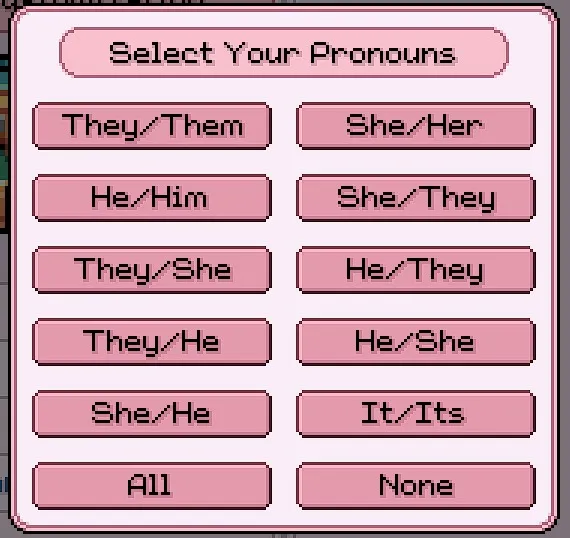Player gender in video game localization
There's this group of Brazilian localizers I'm in and sometimes chat with, and the other day someone showed the following image:

This is from the game Fields of Mistria, a farming sim still in early access, and available only in English.
The group, composed of Brazilians, started chatting about how they would go to localize the text for a game with so many gender options, considering that Brazilian Portuguese is a gendered language with only two grammatical genders, making it hard to deal with the "it" and "they" pronouns.
I wrote in the past about gendered languages and video game translation because, usually, people don't take into consideration that not every language is gender-neutral like English. If a game keeps track of the player's gender, it's possible to manipulate the text to adapt to it. One of the approaches would be to turn every gendered word into a variable that would just be called according to the correct gender. And, while this approach could work in Portuguese, it might break languages that are not only gendered, but also have noun and adjective gendered declensions. It's hard to predict how languages will react when you start messing with their linguistic components individually.
Ok, so, what to do? In cases like this, where there might be a lot of dialogue and it must use the correct gendered words, the safest option would be to translate every line, duplicate it, propagate the translation, and adjust the gender. Here's how I would do it for Brazilian Portuguese:
- We gotta decide how to deal with the "they" and "it" genders, as they are impossible to exist in the formal Portuguese grammar. Luckily, there are a couple of non-official neopronoun systems created for non-binary people that are accepted in the community: the elu and the ile systems. We could use the elu for "they" and ile for "it".
- "All" and "none" are a bit more complicated. I guess, if the game supports it, "all" could just select random gender lines? "None", however, is pretty much impossible, but maybe talking to the queer community, something might come up. In this hypothetical exercise, I'll ignore these two to avoid complicating things.
- The masculine grammatical gender in Portuguese is the "default" because it merged with the Latin neutral over time, making it two-in-one and turning the feminine into the marked grammatical gender, which means "it's the non-default one".
- Because of that, I'd start translating in the feminine, as this would force my brain to recognize every usage of gender-marked noun, adjective, and article related to the player.
- I'd mark every sentence that's gendered and ask the dev to make 3 extra copies of it. Then, it's just a matter of editing the translated lines for the masculine, elu, and ile genders.
- And done. Now the game has 4 working genders for the Brazilian players. The combination of different genders — like "he/she", "she/they", "he/it", and so on — can default to one of them or alternate between them according to context, it would depend on which approach the queer community feels is best.
Adjusting gender is pretty fast if the line is already translated, no need to retranslate or rewrite the whole thing. If the game is capable of tracking gendered lines and selecting the appropriate one, it's just a matter of making sure the tables are correctly aligned and working. Now a complex problem was solved in a somewhat simplistic — and maybe a bit crude — way. At least, it's way better than diving into variables and trying to puzzle sentences around.
Believe me, you do not want that.
